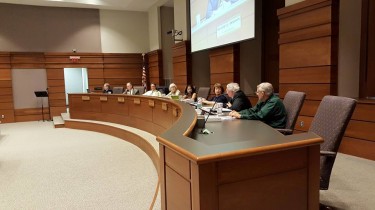Manhattan City Commissioners heard from LGBT supporters during public comment time Tuesday night in City Hall.
Manhattan resident Jerred McKee represented the Flint Hills Human Rights Project and said discrimination is still an issue in the Little Apple.
“I can go home tonight and find an eviction notice on my door because my landlord found out I was gay,” he said. “And I’m sorry, but if you’re okay with living in a society where that is a legal action, then you are just as bad as them.”
In 2011 the commission passed a measure that added sexual orientation and gender identity to the city’s anti-discrimination policy and at the time it was just the second city in Kansas to do so, but it was repealed months later after the make-up of the commission changed.
McKee, who ran unsuccessfully for a city commission seat this year, told commissioners that a recent survey showed discrimination towards LGBT citizens is still a problem.
“The Riley County Community Needs Assessment posed a question: Have you personally experienced or witnessed discrimination in this community based on sexual orientation?” he said. “17.4 percent of respondents said yes.”
McKee also said the Flint Hills Human Rights Project has uncovered seven specific cases of discrimination over the past two years, which include an instance of a couple being told by a reality company that they couldn’t find them a house and another instance where a nurse lost his job after his sexual orientation was discovered.
“I have a huge amount of respect for all five of you,” he told the commission. “But what I fear is that this will fall on deaf ears not because you don’t believe this is happening, but because you lack the political willpower to do something about it.
“Please, prove me wrong.”
After McKee, parents of a transsexual daughter shared their concerns.
“The significantly-reduced likelihood of her finding a good job with benefits, being secure and keeping a residence she rents, or more fundamentally, to be safe from harassment or assault is frustrating and heartbreaking for us,” the mother said.
The father followed in step.
“We’ve always thought that Manhattan, Kan., was a great place for our children,” he said. “Now we feel that our community is willing to protect only some of our children — LGBT children excluded.”
Commissioner Usha Reddi, who was elected in 2013, empathized with the speakers.
“I think most of the commissioners here are on your side,” she said. “There’s a lot of work to be done, not only at the local level but at the state level and as well as the federal level.
“These issues need constant discussion. They’re difficult discussions and they make us feel uncomfortable, but that’s probably why we need to have them, so that we can look forward to some other types of changes.”
This summer the commission passed a measure that added sexual orientation as a protected class to the city’s anti-discrimination hiring policy.
Commissioner Wynn Butler, who was elected to the commission in 2011 and supported the repeal of the additions to the overall anti-discrimination policy, abstained from that vote.
In other items, commissioners discussed proposed Engineer On-Call Services for 2016 and 2017. The proposal hopes to streamline the process for smaller city projects.

